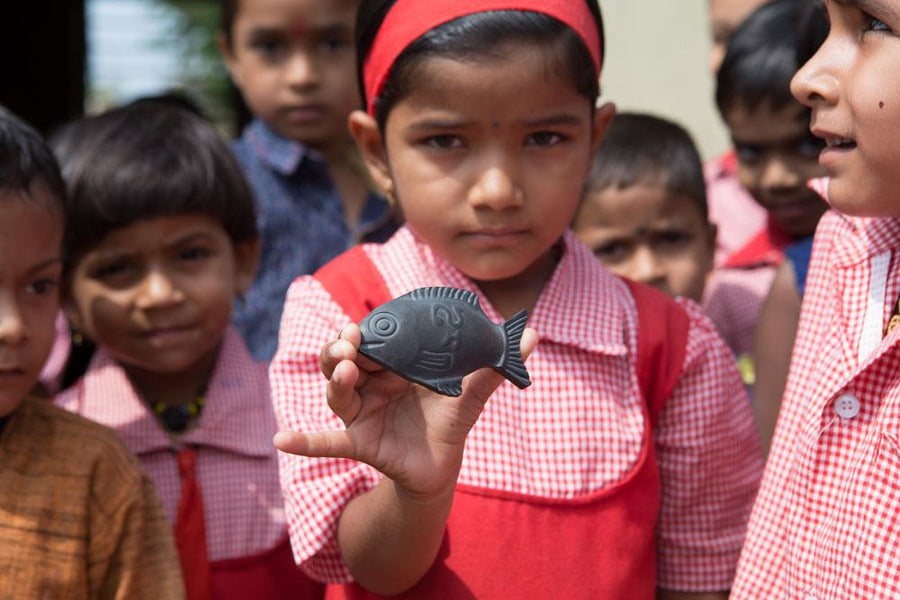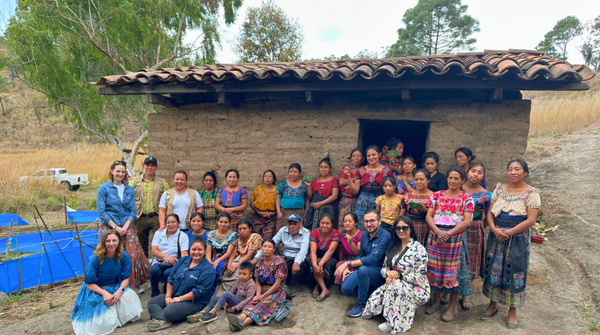
Iron deficiency anemia primarily affects women of reproductive age and children under the age of five. It is the most common widespread nutritional disorder in the world, affecting more than half of the world’s population. Iron deficiency affects more people than any other condition, not only affecting people in developing countries, but also those in industrialized countries (World Health Organization, http://www.who.int/nutrition/topics/ida/en/). Iron deficiency anemia poses serious economic consequences for those who have limited access to iron in their diets. In the developing world, the risks of iron deficiency anemia are childbirth complications, difficulty in school, lowered productivity, impaired physical and cognitive development, and increased risk of morbidity in children. These health consequences are devastating, but one little Fish is trying to change that.

What we give and how it works
It’s as easy as this, you purchase a Lucky Iron Fish and one is sent to you, while another is produced to donate to a family in need. We work with partners who have existing trust on the ground, and we give in a sustainable way to communities in need. We seek partnerships who are established non-profits and health clinics to distribute the Fish. Our project started in Cambodia, but we have now been able to provide Lucky Iron Fish to families across the world, from care kits to the most vulnerable in Haiti, to First Nations, Inuit and Metis communities throughout North America. With every Fish purchased, we are getting one step closer to our goal of getting a Lucky Iron Fish in every cooking pot that needs it, and helping fight iron deficiency around the world.
“Our aim is simple, to create positive, meaningful and sustainable change. Our product benefits people on multiple fronts by creating immediate effects and long-term impact. It’s incredible to see such a simple solution to a complex problem driving a wave of further benefits.” - Lydia Summerlee, Impact and Engagement Specialist, Lucky Iron Fish
So far we have been able to reach 150,000 people in five continents.
How does a Lucky Iron Fish benefit a family? Cooking with the Lucky Iron Fish for 10 minutes in any liquid or broth based meals, provides a significant portion of iron for the day, and is safe to use for the whole family. There are many families that have limited access to iron in their diets, and one simple solution can help with that.
What does impact mean to us?
We are a registered B Corporation, a certification that recognizes our use of business as a force for good. We are part of a community of almost 2000 for-profits in 50 countries spread over 130 industries. Since becoming a B Corporation in March 2014, we have continued to think about ways that we be better, and do better, for the world. We are very proud of our 2016 overall B score of 154, which means we rank in the top one percentile of benefit corporations across the world. One of the highest scoring categories is our company’s impact on community. This is evaluated by looking at supplier relations, diversity and involvement in the local community. The category measures a company’s practices and policies around community service and charitable giving while also assessing whether a company’s product is designed to solve a social issue.
We understand that the Lucky Iron Fish is a simple and affordable solution for many people suffering from iron deficiency across the globe. Through our Buy One Give One program, we are able to have a strong social impact. Most recently, we have worked with Mom2Mom Africa in Uganda, the Maher clinic in India, the Liger Charitable Foundation and the Future of the Khmer Children Organization in Cambodia.

“To me, impact means making each step we take meaningful, both for ourselves and for those we support. It is about empowerment, enabling communities, families and individuals to manage their health and wellbeing in the most informed, effective and enduring way possible. It is about engaging, inspiring and empowering those most in need.” - Marianne Teoh, Southeast Asia Regional Manager, Lucky Iron Fish
Mom2Mom Africa is a Canadian non-profit that was founded in 2012, with a mandate to empower women and children through education. In 2014, Mom2Mom Africa launched the Sustainability Project, designed to build on the efforts of the CHETI Schools to be self-sufficient and to provide quality education to students. On a recent trip to Arusha, Tanzania, the organization was able to provide Lucky Iron Fish to the women and children in the community. “The Lucky Iron Fish will be so helpful in maintaining the children’s health.” Alison Fraser, Founder/Director, Committee Lead, Urafiki Program

“Maher” (Marathi) means Mother’s Home. The organization was founded by Sister Lucy Kurien in 1997. The organization represents a haven of hope, a place of belonging and understanding. It is their mission to help destitute women, children and men from all over India exercise their right to a higher quality of life, irrespective of gender, caste, creed or religion. Maher cares for 862 children, 328 women and 67 men. They also support more than 10,500 people in slums and villages, through food, water and clothing supplies, as well as self-help-groups, trainings and education for children. “This solution is so great. We work in the slums in India and see iron deficiency all the time.” -Sister Lucy, Maher

We also worked with a non-profit school in Cambodia, the Liger Learning Center, which is a project-based school of promising Cambodian students. These students are diligently working to become the future "change agents" of Cambodia, and they are already making a strong impact in the world. One of the first projects this school year, for a group of 12, was to analyze health issues in Cambodia. They discovered that many of the health issues in their country are due to diets that lack vital nutrients like iron.


With the guidance of Lucky Iron Fish the students were able to get an indepth look at iron deficiency anemia in Cambodia. To better understand the issue, the Liger students read all the background research on the company. They analyzed the professions of the Board of Directors, staff, and International Advisory Board to better understand the expertise behind LIF. The students recreated a day at LIF and each represented a staff or board member. The class reviewed the various international recognition LIF has received, like the Good Design Award (one of the most prestigious design awards in the world) to get a better understanding of how the organization is viewed by society.

They learned about different types of anemia, the need for iron in hemoglobin to carry oxygen, foods high in iron, components of a healthy diet, iron supplements, and how iron boiled with food could increase available iron for absorption. To share their new knowledge they created an informative drama on iron deficiency anemia and LIF, then presented it to rural Cambodians. They created three instructional videos, in Khmer, to support LIF: Overview of a LIF Workshop, How to Use the LIF, How to Clean the LIF
“As their Science Learning Facilitator, it was a powerful experience watching these students analyze complex information and develop enthusiasm for solving health issues in their country. We appreciate the support provided by LIF to understand anemia, and special appreciation for the country staff that worked closely with these students.” Karen Krieger, Learning Facilitator, The Liger Charitable Foundation
What is next?

We have started out strong, and with your help along with our incredible partners, we have been able to reach families in need. We are excited for what next year has to bring and look forward to future partnerships that will help us get closer to fulfilling our goal of getting a Fish in every pot that needs it.
“In 2016 We saw some incredible growth for the Lucky Iron Fish. It became available in 66 countries around the world, and we established our largest partnerships yet that will help provide free Lucky Iron Fish to families in need all over the world. As we look toward 2017, we see an exciting opportunity to expand into new emerging markets such as India. India has a population of 1.25 billion people, and 59% of women suffer from iron deficiency. We feel our small but mighty Fish will have a profound impact in this diverse country. In 2017 we will also be expanding our retail presence in a variety of stores across Canada and the United States. All of the Lucky Iron Fish sold in a retail location will still be a part of our ‘Buy-One-Give-One’ program. Thinking ahead to 2017, we are focused on expanding our global impact through our strong partnerships. Together, we will put a fish in every pot. ”
-Dr. Armstrong, CEO and Founder, Lucky Iron Fish




